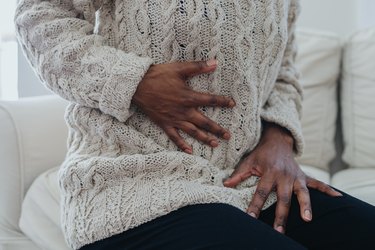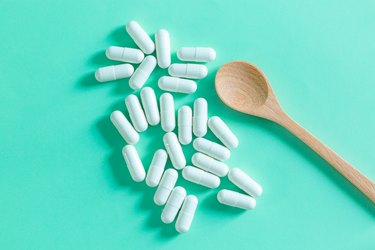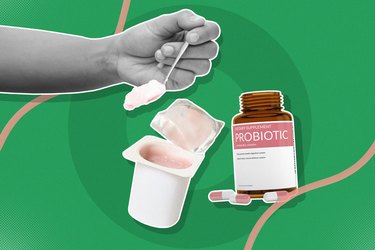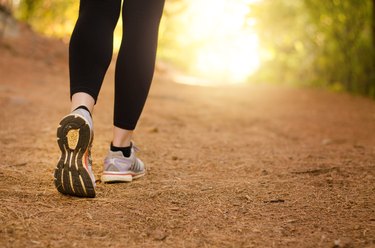
Irritable bowel syndrome, or IBS for short, can be uncomfortable to say the least. Symptoms like abdominal pain, bloating and diarrhea can come and go unexpectedly, interfering with work and life.
The same can be said for a condition called post-infectious IBS, which has many of the same symptoms but a different set of causes and triggers.
Video of the Day
Video of the Day
Treating post-infectious IBS may look similar, too, but there are some subtle differences to keep in mind.
Here, learn everything you need to know about post-infectious IBS, including how long it lasts and what the treatment options are.
What Is Post-Infectious IBS, Exactly?
Post-infectious IBS (or PI-IBS) is a subgroup of IBS that only happens after you've had an infection — typically gastroenteritis (aka, "stomach flu") or food poisoning. But it could also result from any type of infection where the lining of your stomach becomes inflamed, from bacteria, viruses or parasites, per the National Library of Medicine (NLM).
If your GI symptoms — like abdominal pain, diarrhea, gas and bloating — stubbornly continue after the infection has been treated and resolved, you likely have PI-IBS.
Turns out, around 10 to 15 percent of people in the U.S. have IBS, per the NLM, but one April 2021 study in Gastroenterology Clinics of North America found that more than half of those cases could actually be PI-IBS.
Keep in mind that diarrhea is a common side effect of antibiotics, per the Cleveland Clinic. However, it's usually mild, short-lived and doesn't come with the significant abdominal bloating, pain and discomfort associated with PI-IBS.
What Causes It?
Like "regular" IBS, no one knows exactly why PI-IBS happens. But some factors that might increase your risk of developing the condition include the following, says Sarah Robbins, MD, a gastroenterologist based in British Columbia:
- Severe infection
- Prolonged fever
- Antibiotic use during the illness
- Psychological factors like anxiety and depression
- Disruption in the balance of beneficial and harmful bacteria, known as dysbiosis
- Changes in the immune system that affect gut function
- Ongoing gut inflammation
"PI-IBS is also more likely to occur from a change in our gut microbiome, versus regular IBS, that's most often affected by the foods we eat and stress," says Andrew Boxer, MD, a board-certified gastroenterologist in New Jersey.
How Long Does Post-Infectious IBS Last?
Unlike chronic IBS, which often requires lifetime symptom management, PI-IBS is usually temporary.
The length of time that PI-IBS sticks around is different for everyone. "Sometimes, it can just last a few days, but most commonly, it can last weeks...even one to two months," Dr. Boxer says.
In rare cases, PI-IBS can even last for years. Dr. Boxer, for instance, has treated veterans who developed GI infections while overseas, only to return with PI-IBS that lasted several years after infection.
In fact, "approximately 25 percent of individuals who experience bacterial gastroenteritis report consistent IBS symptoms six months post-infection," Dr. Robbins says. "While some patients' symptoms resolve within a year, others experience symptoms for several years."
Over time, it can become hard to tell whether you're dealing with chronic IBS or PI-IBS, Dr. Robbins says. If it tends to carry on, gastroenterologists will change their strategy to focus on relieving symptoms rather than curing the condition, no matter what initially caused it.
Some other things that could cause PI-IBS to stick around longer include a severe initial infection, or the presence of depression and anxiety, Dr. Robbins adds.
In fact, IBS and anxiety are closely related and sometimes treated in a similar fashion — through relaxation techniques or antidepressants, per the UNC Center for Functional GI & Motility Disorders.
Treatment Options for Post-Infectious IBS
Thankfully, PI-IBS is treatable, and symptoms can be managed in a number of different ways. And the treatment is similar to that of regular IBS.
The focus of treatment can involve healing the gut microbiome, but most often "is just about symptom relief," Dr. Robbins says. "Management can include dietary changes, medications, probiotics, behavioral therapies and talk therapy," she adds.
Dr. Robbins recommends the following approaches to her patients:
1. Try Changing Up Your Diet
Incorporating a low-FODMAP diet is a helpful tool for many people with IBS. FODMAPs (or fermentable oligo-, di-, monosaccharides and polyols) are short-chain carbohydrates (sugars) that can be difficult for the small intestine to digest, per Johns Hopkins Medicine.
Some foods high in FODMAPs include the following, per Johns Hopkins Medicine:
- Dairy products like yogurt and ice cream
- Wheat-based products like cereal, bread and crackers
- Beans
- Some vegetables like asparagus, onion and garlic
- Some fruits like apples, cherries, pears and peaches
Eating a diet low in these FODMAPs can help reduce the symptoms of both PI-IBS and regular IBS. Some low-FODMAP foods include the following, per Johns Hopkins Medicine:
- Eggs
- Meat and seafood
- Almond milk
- Rice
- Quinoa
- Potatoes
- Eggplant
- Grapes
- Blueberries
2. Try Probiotics
Dr. Robbins says studies are limited, and most don't distinguish between idiopathic (regular) IBS and PI-IBS, but there is some evidence that probiotics may help reduce symptoms of PI-IBS after a bout of gastroenteritis.
According to one older August 2013 review in the Indian Journal of Medical Research, there's not enough strong evidence of probiotics' benefit to recommend it as a primary therapy for IBS, but incorporating certain strains (like Lactobacilli and Bifidobacteria) may help people experience an overall improvement of their symptoms.
"Probiotics are generally well-tolerated and considered safe for most people," Dr. Robbins says. But you should still talk to your doctor before taking them, especially if you have any underlying health conditions.
3. Consider Medication
There are a few different types of medication that can be considered to treat PI-IBS symptoms in the short-term if other lifestyle changes have not helped. These include the following, per Dr. Robbins:
- Antispasmodics: Dicyclomine (Bentyl) and hyoscyamine may reduce abdominal pain on a short-term basis. These are prescribed by your doctor.
- Antidiarrheals: Imodium can be used for those who need help relieving diarrhea.
- Laxatives: MiraLax or Dulcolax can be used for those who need help relieving constipation.
- Antidepressants: Low doses of tricyclic antidepressants (like amitriptyline) or SSRIs (like paroxetine) can surprisingly help manage abdominal pain and bowel habits. These can be prescribed by your doctor.
4. Incorporate Talk Therapy and Stress Management
Living with PI-IBS can be a stressful experience. Even the thought of experiencing an attack can amplify your anxiety, which in turn can increase your GI symptoms.
That's why managing your emotions is crucial. Reducing your stress through relaxation techniques like deep breathing, yoga and meditation can help in the day-to-day. Additionally, finding a therapist to help you talk out your emotions can be a beneficial experience for long-term management of both PI-IBS and IBS.
Cognitive-behavioral therapy (or CBT), in particular, has been rigorously tested in clinical trials and consistently demonstrates long-lasting improvement in those with IBS symptoms, according to a July 2017 review in Psychology Research and Behavior Management. This type of therapy can help you change your thoughts surrounding your stress and condition.
5. Get Enough Exercise
A small January 2015 study in the World Journal of Gastroenterology found that increasing physical activity was associated with positive long-term effects on IBS symptoms and psychological symptoms linked to the condition.
But keep in mind that when you're recovering from an infection, it might be best to take things slow. Start with gentle exercise like yoga, stretching or walking. From there, you can increase your level of physical activity depending on the severity and frequency of your PI-IBS symptoms.
(Sometimes exercise can stimulate bowel movements, which is not ideal for people dealing with diarrhea from PI-IBS.)
6. Try Gut-Directed Antibiotics
It may be possible you're experiencing PI-IBS symptoms because your GI infection still hasn't healed. In this case, your doctor can run stool samples and other tests to determine if an infection is still present, and then prescribe antibiotics accordingly.
Rifaximin, a non-absorbable antibiotic, is often prescribed to treat infections like E. coli, and in some cases, IBS, per the Mayo Clinic.
When to See a Doctor
Any time you experience changes in your bowel habits that cause pain or discomfort, it can be worth your while to visit your doctor and determine the cause. If you're experiencing diarrhea, bloating and/or constipation after a GI infection, it's possible you have PI-IBS and can benefit from any of the above treatments.
"Any unusual signs and symptoms you experience should be brought up to your doctor," Dr. Boxer says.
Watch out for signs of weight loss, blood in the stool, fatigue, fainting, difficulty swallowing, diarrhea for a few weeks with no regular bowel movements, nausea, vomiting and pain when you eat. These could indicate you are dealing with a more serious health issue that may require immediate medical attention or testing, like a colonoscopy, endoscopy or MRI.
Ultimately, PI-IBS itself is not life-threatening and can be managed. Be patient in riding out its effects post-infection, and always talk to your doctor if you have concerns.
- Irritable bowel syndrome
- Gastroenteritis
- Gastroenterology Clinics of North America: "Post-infection Irritable Bowel Syndrome"
- GANJ Gastroenterology: "Andrew Boxer, MD"
- NIDDK: "Symptoms & Causes of Irritable Bowel Syndrome"
- University of North Carolina: "The Use of Antidepressants in the Treatment of Irritable Bowel Syndrome and Other Functional GI Disorders"
- Johns Hopkins Medicine: "FODMAP Diet: What You Need to Know"
- Indian Journal of Medical Research: "Treatment of irritable bowel syndrome with probiotics: growing evidence"
- Microbiology Open: "Impact of antibiotics on the human microbiome and consequences for host health"
- Psychology Research and Behavior Management: "Cognitive-behavioral therapy for patients with irritable bowel syndrome: current insights"
- World Journal of Gastroenterology: "Intervention to increase physical activity in irritable bowel syndrome shows long-term positive effects"
- Mayo Clinic: "Rifaximin (Oral Route)"
- Cleveland Clinic: "Antibiotics"
Is this an emergency? If you are experiencing serious medical symptoms, please see the National Library of Medicine’s list of signs you need emergency medical attention or call 911.





